Are you unsure about whether pre-workout supplements are right for you but you’re looking for the perfect pick-me-up for your workout?? It’s definitely a difficult choice when there are so many options available.
You’ve likely seen people at the gym shaking their bottles before they start lifting weights, downing what’s known as pre-workout supplements. These concoctions promise to boost your energy, focus, and performance, making sure you get the most out of every rep and run. They’ve become as routine as the workout itself for many people.

However, not everyone is keen on using these supplements, often loaded with artificial ingredients that can leave you more buzzed than your morning cuppa.
If you’re one of the health-conscious bods or simply someone who’s had enough of the jitters and the crash that can come post-gym, you might be searching for alternatives that are just as effective at pumping you up. Natural pre-workouts can be gentler on your system while still providing that much-needed edge to your exercise performance.
So, could your kitchen be hiding some powerful, natural alternatives? Absolutely.
There’s some hidden gems that are not only health-friendly but can also help you stay fired up through your squats and lunges.
From a simple banana to give you a quick carbohydrate boost, to a small black coffee for a focus-enhancing punch, you’ll find natural solutions can sometimes trump those expensive powders.
Let’s look at what other wholesome goodies can power your next workout, without the side effects that might have had you second-guessing your pre-workout ritual.
Understanding Pre-Workout Supplements
When you’re wanting to kick your exercise routine up a notch, you might hear gym buffs chatting about pre-workout supplements. These mixtures of multiple ingredients promise to rev up your energy and improve your workout. But what’s really in that powdered mix you’re scooping into your water bottle?
What Is Pre-Workout?
Think of pre-workout as the gee-up for your body. It’s a blend typically taken before exercise, designed to boost your energy levels and enhance performance.
Picture yourself about to lift weights or sprint and your body’s asking for a bit more zip – that’s where pre-workout steps in.
Common Ingredients in Pre-Workout Supplements
Most pre-workouts have very similar ingredients in varying quantities. The main ones you’ll find in most brands are:
- Caffeine: The main stimulant that boost energy, focus and concentration. It’s a swift kick that picks you up, helping you feel more awake and ready to tackle those squats.
- Beta-alanine: Ever feel tingles after drinking a pre-workout? That’s beta-alanine. It helps battle muscle fatigue by reducing lactic acid build-up, so you can keep going and going.
- Creatine: Known for supporting muscle strength, power and growth, creatine is like the gym buddy that spots you, helping your muscles push out that one last rep.
- Citrulline: This ingredient is an unsung hero. It helps with blood flow to your muscles, so they work better and don’t tire as quickly.
These are just a few; there’s a whole cocktail of components mixed to get you going. But, not all ingredients are clear-cut in their benefits or side effects. Supplement regulation can be a grey area, so you’ve got to keep your wits about you when picking a pre-workout. Some have problematic ingredients that might not play nice with your body.
Natural Alternatives to Pre-Workout
Choosing natural alternatives to synthetic pre-workout supplements can be both effective and beneficial for your health. Let’s explore whole foods and snacks that can provide the right kind of fuel for your exercise routine.
Whole Foods as Pre-Workout
Bananas are a powerhouse when it comes to natural pre-workout. They’re loaded with carbohydrates and potassium, which can boost your energy levels and prevent muscle cramps. Imagine you’re gearing up for a run; grabbing a banana could give you a swift kick of energy to keep your legs moving.
Oats are an excellent choice for a more sustained release of energy due to their complex carbohydrates and they’re brimming with nutritional benefits. They’re like a slow-burning log on a fire, perfect for ensuring you have enough fuel throughout your workout.
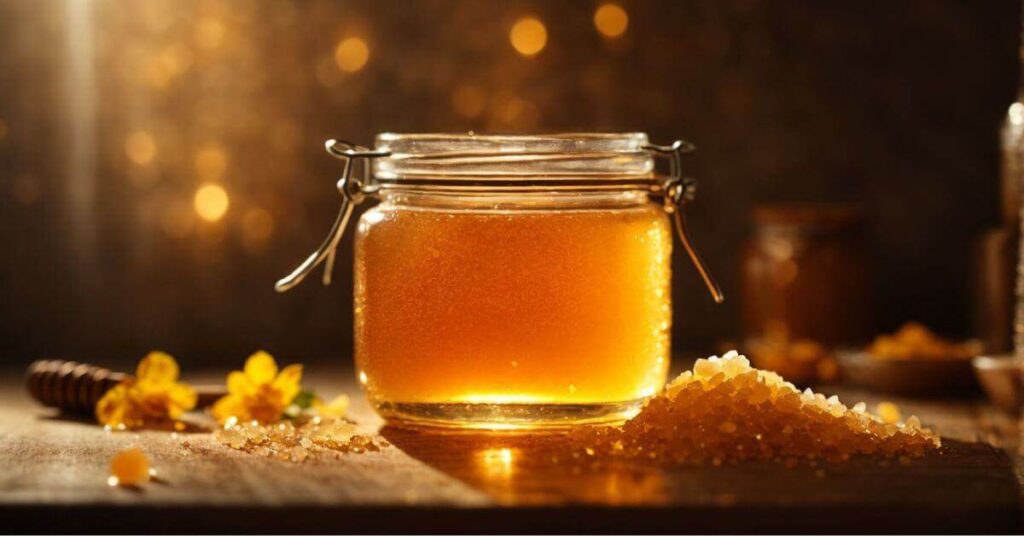
Honey and Himalayan Salt is another popular pre-workout alternative, especially with bodybuilders. The sugars from honey can be absorbed in the bloodstream without needing to be digested first, giving an immediate energy boost. While salt contains over 80 natural major and trace minerals which are lost in sweat, helping to balance fluid levels and prevent cramps.
Other whole foods that can serve as pre-workout fuel include apples, berries, and yoghurt. They provide a mix of hydration, simple sugars, and protein to support your energy levels and muscle health.
Snacks for Sustained Energy
You could also try combining different foods for a balanced snack, such as:
Banana with Peanut Butter: A banana is a great source of natural sugars, simple carbohydrates, and potassium. Spreading a tablespoon of peanut butter on it adds protein and healthy fats, making it a balanced snack.
Greek Yoghurt and Berries: Greek yoghurt is high in protein, while berries like strawberries or blueberries offer natural sugars and antioxidants. This combination provides a good balance of protein and carbohydrates.
Oatmeal with Almonds and Honey: A small bowl of oatmeal gives you a sustained release of energy thanks to its complex carbohydrates. Adding a few almonds provides healthy fats and protein, while a drizzle of honey brings a touch of sweetness and quick energy.
With any pre-workout snack or supplement, you need to give them time to work so look to consume these snacks around 30-60 before your workout
Drinks That Boost Exercise Performance
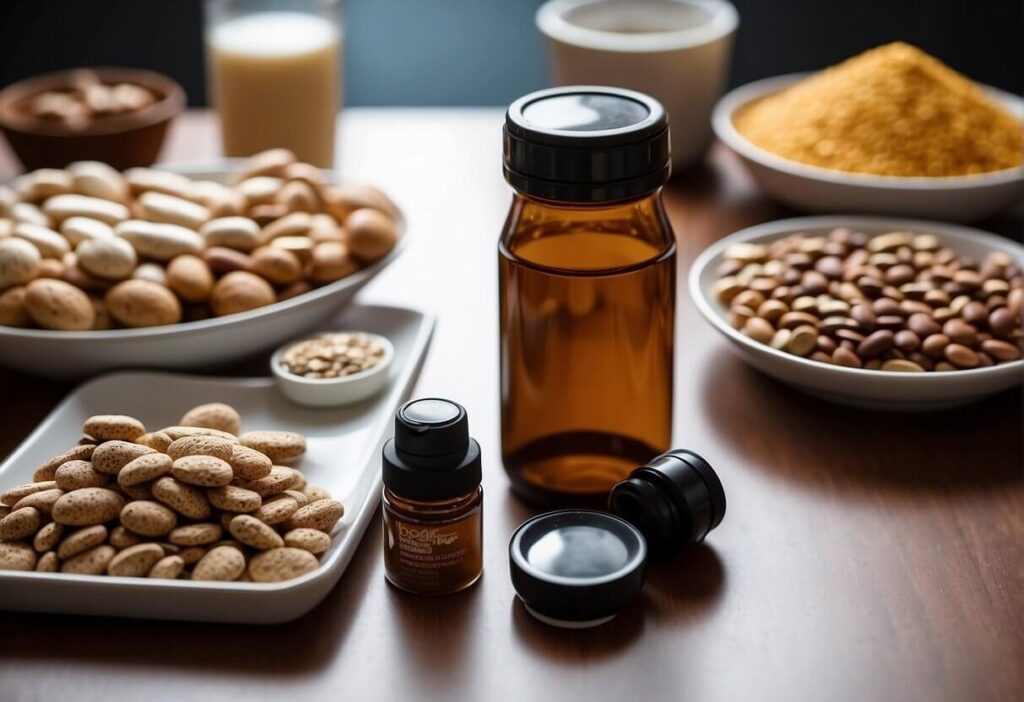
Let’s look at pre-workout drinks – not the mixed in pre-workout supplements drinks but the alternatives you can use to power your workout.
A mug of steaming coffee might be your morning wake-up call, but it doubles as a fantastic pre-workout. The caffeine kick not only sharpens your focus but also can help you push harder during your exercise regime. Remember, though too much can make your hands shake, so keep it to a cup.
Green tea is another great option if you’re not so keen on coffee. It’s full of antioxidants and has a moderate caffeine content to give you a boost. Bonus points: it may help you burn fat more effectively.
Now, ever thought of beetroot juice? I won’t lie, it doesn’t sound appealing to me at all! But it’s rich in nitrates and will help your blood vessels relax, improving blood flow. It will give you a boost of endurance allowing you to go the extra mile, or lift that extra weight.
Most pre-workout supplements have extracts And did you know, these natural energizers can be just as effective as those mysterious powder mixes, proving that mother nature’s got your back when it’s time to sweat it out? Harness these drinks and you’ll be giving your workouts a massive high-five. Energize smartly, and you’re set for success!
Other Pre-Workout Ingredients You Can Get From Your Diet
Citrulline
Citrulline boosts nitric oxide production in the body which improves circulation, blood flow, and oxygen delivery to muscles. This enhances endurance while giving an impressive muscle pump.
Citrulline can be found in watermelon with a cup containing around 500mg. Most pre-workout supplements contain around 6-8 grams of citrulline which should be taken around an hour before exercise.
Be wary of citrulline-malate blends common in pre-workouts. Isolate citrulline itself provides better results.
Creatine
Creatine is one of the most studied and effective supplements for building strength and muscle mass. It can be taken any time of day.
It can be found mainly in meats like fish and beef and also supplemented in powder or liquid form.
The recommended dose is 5 grams per day but a ‘loading phase’ can increase that to 20 grams per day for 5-7 days to saturate your muscle stores.
You can expect to gain a few pounds in water weight but you’ll also experience a boost in anaerobic power output, making it a winner for high-intensity training. Be sure to stay hydrated.
Beta-Alanine
This non-essential amino acid reduces lactic acid build-up by producing carnosine, allowing you to crank out more reps before fatigue sets in.
Beta-alanine improves high-intensity exercise performance when taken consistently. You can get trace amounts from poultry and fish.
If taken in high doses, you may experience a tingling sensation which is caused by overstimulation of neurons in the brain. It is harmless but can be an odd feeling at first.
Lifestyle Practices That Can Boost Exercise Performance
Concentrated Breathing
You know that feeling when you’re gasping for air during a tough workout? Well, concentrated breathing techniques could be your new best friend!
By focusing on taking deeper breaths, you increase your oxygen intake, which is like a supercharge for your muscles. Try this: breathe in for a count of four, hold for four, and exhale for four. It’s like a mini meditation, and it might just help you power through those last few reps.
Cold Water Therapy
Ever jumped into a cold shower and felt instantly awake? That’s cold water therapy giving you a natural energy boost!
It’s not just about shocking your system, though. Splashing cold water on your face or taking a quick chilly dip can invigorate your mind-body connection, keeping you sharp and focused. So go on, give it a go – it might be brisk, but your workout will thank you!
Pre-workout Routines
They say a good start is half the battle, and that’s spot-on with your pre-workout routine. It sets the stage for how you’ll perform.
Incorporate dynamic stretches or a quick cardio warm-up to get your blood flowing. Remember, it’s not about the speed, but waking your body up and getting the blood flowing to your muscles.
Benefits of Natural Pre-Workout Alternatives
The general benefits of traditional pre-workouts are well known. They include the ability to train harder, and longer with extra strength and endurance. Add to that an increased energy and focus and a faster recovery between sets and it’s easy to see why they’re so popular.
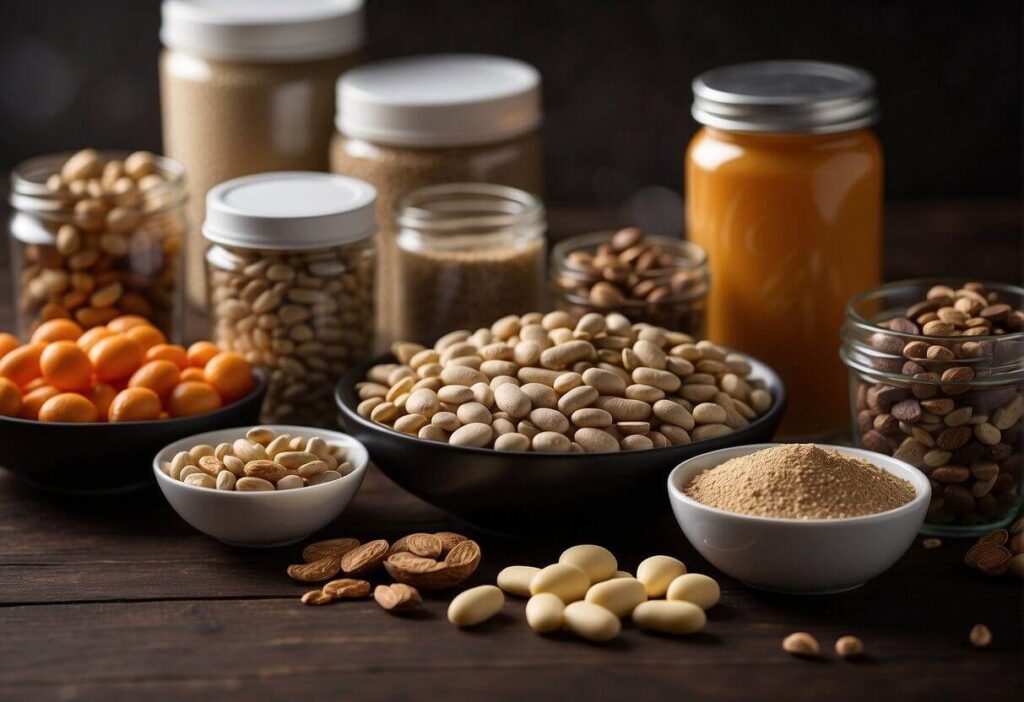
Stepping away from conventional pre-workouts though can bring you a bunch of benefits—think better health and nutrition, lighter on your pocket, and you wave goodbye to those weird jittery side effects.
Improved Health and Nutrition
You’re not just fuelling workouts with natural pre-workout alternatives; you’re loading up on nutrients that do wonders for your body.
You know how you stuff your face with whole foods like bananas or peanut butter toast before heading out? That’s because they’re packed with macros and micronutrients that give you energy and keep your engine running smoothly.
A lot of them have fibre, which means you won’t get hungry mid-workout. Plus, they’re often lower in sugar content, keeping those blood sugar levels steady.
Sustainability and Cost-Effectiveness
Think about this: scooping out powders from big plastic tubs doesn’t sound too sustainable, does it?
Choosing foods like oats or a handful of nuts helps the planet and, guess what, it’s cost-effective too. Over time, using food from your kitchen instead of fancy supplements will save you cash.
And let’s be honest, shaking up a drink with natural juice or coconut water is better for keeping you hydrated than factory made powders.
Avoiding Unwanted Side Effects
Ever had that too-much-coffee feeling where your heart’s racing and you’re a bit shaky? That’s your body telling you you’ve had a little bit too much pre-workout.
Using natural pre-workout alternatives means you sidestep those nasty feelings. Swapping a manufactured supplement with a high sugar content for a bit of fruit or some yoghurt gets you ready to smash your workout, minus the side effects.
Plus, natural options tend to go easy on your tummy since they’re not stuffed with weird ingredients that sound like a science experiment.
Potential Risks of Pre-Workout Supplements
Before you reach for that scoop of pre-workout, let’s understand some possible issues you might not have bargained for. Pre-workout supplements might have effects that could throw your body all out of kilter.
Addiction, Tolerance & Crashing
There’s a real possibility of becoming addicted, mainly to the caffeine, and this can lead to developing a tolerance. When you’re no longer feeling the effects, you’ll increase your dose which can be dangerous.
If you decide to stop taking pre-workout, you’re going to feel a ‘crash’ when coming off the stimulant effects.
Overstimulation and Impact On The Nervous System
Most pre-workout formulas are chock-a-block with caffeine, which can be like a bolt of lightning to your central nervous system.
It can give you a whacking great jolt of energy but can also lead to jitteriness, insomnia, and an increased heart rate.
Imagine an energy-drink or post-coffee high overstaying its welcome, making you feel a constant buzz – that’s overstimulation.
Disrupted Sleep
The high caffeine content in pre-workout can cause sleep issues like insomnia if they’re taken too late in the day. It’s really easy to do when the dosage isn’t clear in some supplements.
Gastrointestinal Issues
Occasionally, pre-workout can make you feel queasy or need to run to the bathroom more often than you’d like, dealing with symptoms like bloat and gas. Your gut’s doing somersaults, and not the fun kind.
Dehydration and Electrolyte Imbalance
Remember, pre-workout’s not just about getting pumped; it’s a delicate dance of hydration, too.
A concoction of ingredients, especially caffeine, can lead your body to sweat more and pee more, potentially leading to dehydration.
Eventually your body might hit a ‘crash’ point where you’ll be getting a headache, feeling dizziness, or feeling as parched as a desert.
Who Should Avoid Pre-Workout
While generally safe for healthy adults, certain populations are better off avoiding pre-workout supplements:
- Those with heart conditions or high blood pressure
- People who are sensitive to stimulants
- Anyone who wishes to avoid dependency
- Teenagers and adolescents under 18
- Pregnant or breastfeeding women
- Individuals who take prescription medications that could interact
Of course, it’s always wise to consult with your doctor before trying any new supplement, especially if you have medical concerns.
Will Pre-Workout Help With Muscle Gain?
Two of the main ingredients in pre-workout can directly support muscle growth:
- Creatine has been consistently shown to increase lean muscle mass by providing muscles more rapid energy. This allows you to lift heavier weights and support muscle protein synthesis.
- BCAAs (branched-chain amino acids) are quickly metabolized in muscle tissue and aid in the synthesis of new muscle proteins to enhance muscle growth.
So in short, yes – the creatine and BCAAs in pre-workout can complement a muscle-building training and nutrition program. However, the type of exercise and your diet play a much bigger role when it comes to gaining muscle mass and strength. Pre-workout is just temporary support.
Tailoring Pre-Workout to Your Fitness Goals
Choosing the right pre-workout alternative is pretty simple when you know what you’re working towards.
For strength and power: Caffeine, creatine, citrulline, carbs
For muscle endurance: Caffeine, citrulline, beta-alanine
For muscle growth: Caffeine, creatine, BCAAs, carbs
For energy: Caffeine, carbs
For circulation: Citrulline, beetroot juice
3 Cheap DIY Pre-Workout Recipes to Make at Home
Conclusion
While traditional pre-workout supplements offer a convenient and powerful boost to your workout regimen, they come with potential risks and side effects that can’t be ignored. Addiction, tolerance, overstimulation, and gastrointestinal issues are just a few of the drawbacks that might make you think twice before scooping that powder into your bottle.
On the flip side, natural alternatives offer a myriad of benefits, from improved health and nutrition to cost-effectiveness and sustainability. Foods like bananas, oats, and honey, as well as drinks like coffee and green tea, can provide the energy and endurance needed to power through a workout without the adverse effects associated with synthetic supplements.
Moreover, incorporating lifestyle practices such as concentrated breathing and cold water therapy can further enhance your exercise performance in a holistic manner.
It’s also important to remember that muscle gain and overall fitness are influenced more by your overall diet and exercise routine than by pre-workout alone.
Ultimately, whether you choose a manufactured pre-workout supplement or opt for natural energizers, the key is to listen to your body, consider the pros and cons, and make an informed choice that aligns with your health needs and workout aspirations. By doing so, you’ll ensure that you’re not only energized for your workouts but also taking care of your body in the long run.
Other resources can be found here:
Frequently Asked Questions
Looking into pre-workout alternatives often brings up many questions. Here I’ve answered some of the most common FAQs:
Q. What Can I Use Instead Of Pre-Workout?
A. Some top natural pre-workout alternatives include strategic nutrient timing with carbs and protein, caffeine from coffee or tea, creatine, citrulline, beta-alanine, and beet juice. Lifestyle strategies like proper sleep, hydration, and exercise warm-ups also optimize workouts. Ultimately you can experiment to see which standalone ingredients work best for you.
Q. Is coffee a good pre-workout?
A. Coffee can certainly provide a boost thanks to its caffeine content. Consuming 1-3 mg of caffeine per kg of body weight 30-60 minutes before exercise is an effective pre-workout. Time it correctly so the effects kick in when you need them during your workout and don’t disrupt sleep later.
Q. What is the best natural pre workout?
A. There is no single best natural pre-workout since different ingredients work for different people. Creatine and caffeine tend to provide the most noticeable performance enhancement for strength and endurance. Citrulline is excellent for muscle pumps. Carbs fuel your workout. Consider your goals and experiment with caffeine, creatine, citrulline, carbohydrates and other ergogenic aids to formulate the best custom natural pre-workout for you.

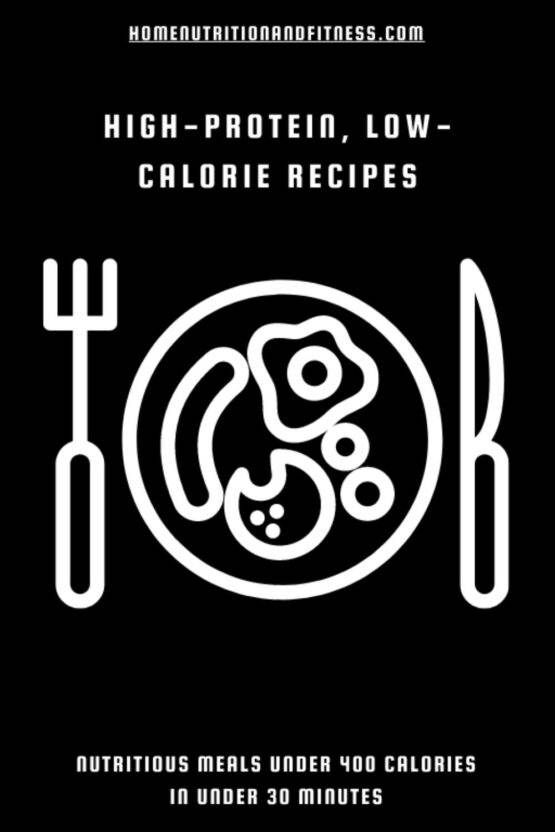




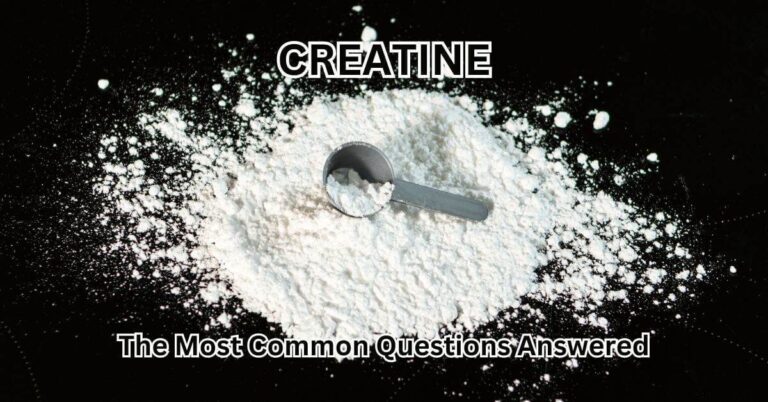

Wow, there is a lot of useful information in your article on pre-workout possibilities, I love all the tips and tricks! I didn’t realize that eating carbs before a workout can help me with fueling my muscles, as I thought it was proteins actually doing is,so I must be wrong! Or is it after a work out that I should have a protein bar or protein drink? What is your opinion on this please? thanks!
Hi Lizzy. Ingesting protein before or after a workout is largely irrelevant to be honest. Research has shown there to be no difference in muscle hypertrophy between pre and post protein consumption, it’s the total daily protein intake that matters most. Protein contains amino acids that help to rebuild and repair muscle tissue, whereas carbs are the body’s main fuel source. It’s important to eat easily digestible carbs prior to workout.
My personal preference is a banana and a coffee prior to working out for energy with a protein shake either with or after my workout with a 5g serving of creatine powder. I take 5g of creatine on a daily basis to maintain my creatine stores in my muscles, even on rest days.
Wow, this is a lot to take in! I’ve always heard about pre-workout supplements but never really knew what they were all about. It’s cool to see how they’re designed to give you a boost in energy and focus for your workouts. But it’s not just about energy, they also help with strength, endurance, and performance. That’s pretty impressive!
I like how this article doesn’t just hype up the benefits but also talks about the potential downsides. It’s a good reminder that there’s no magic solution and that we need to be mindful of things like dependency and side effects.
The part about alternatives to pre-workout supplements is really interesting. I mean, who knew you could get some of the same benefits from things like caffeine, carbs, and even beetroot juice? And the reminder about the importance of sleep and hydration is spot on. I guess it’s not just about what you take but also about taking care of your overall health.
All in all, this is a lot of great info. It’s definitely given me a lot to think about when it comes to pre-workout supplements and how to get the most out of my workouts.
Hi Constanza,
Thanks for your feedback and I’m glad I’ve been able to give you more of an insight into pre-workout and its alternatives. Supplements are a great aid to anyone who is looking to enhance their workout performance but some people don’t agree with their use which is why I put forward some more natural alternatives.
All the best
Chris